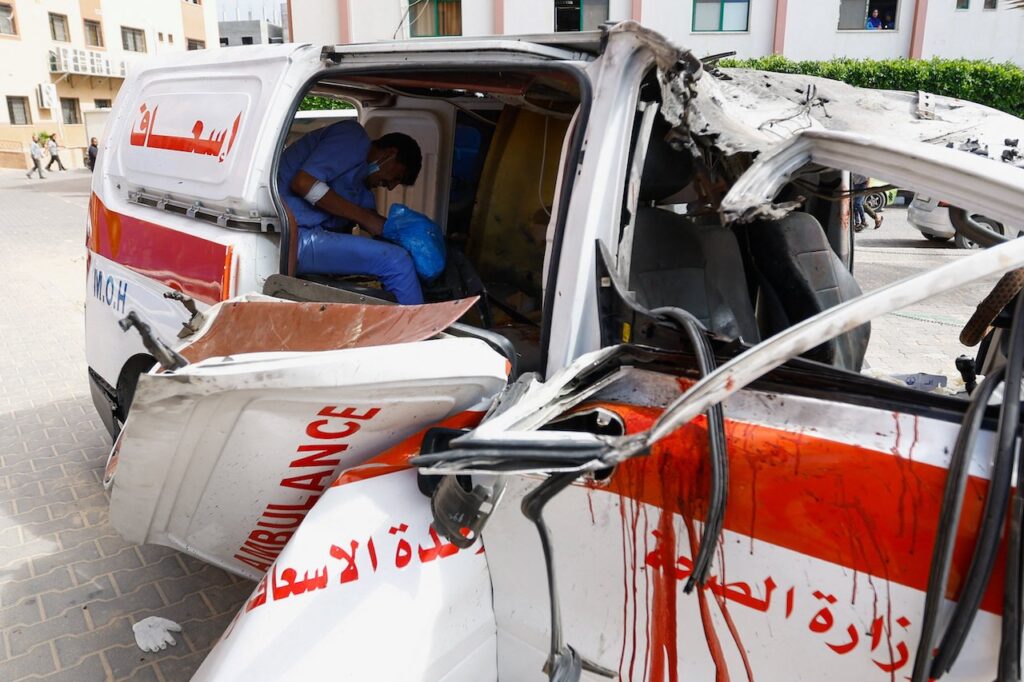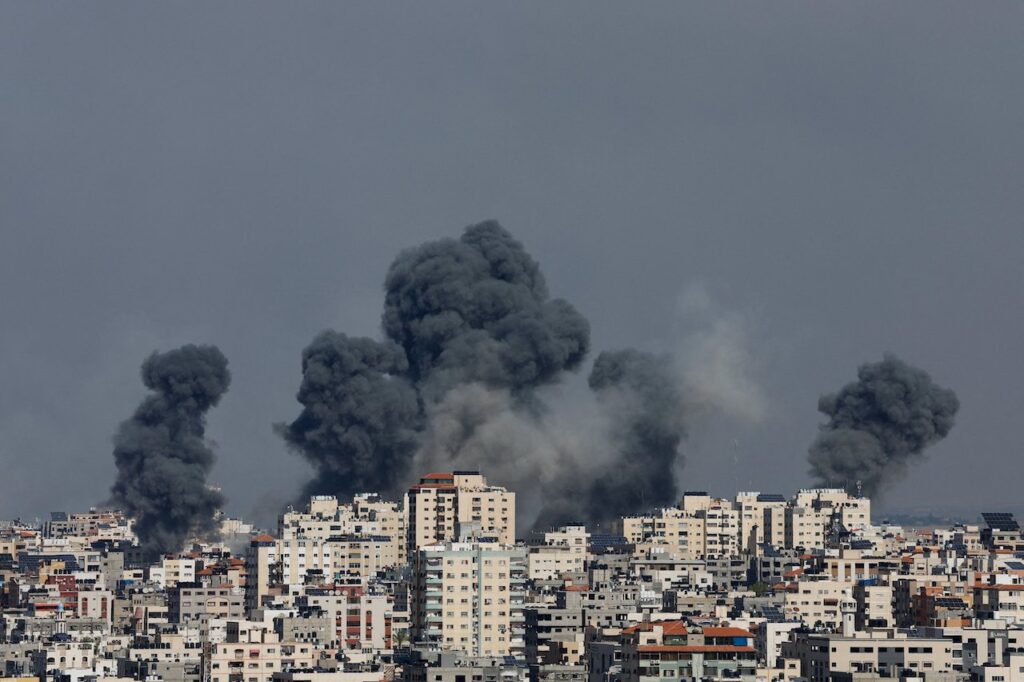JERUSALEM (OSV News) — The Latin Patriarchate of Jerusalem called Oct. 7 for secular and religious leaders around the world to help de-escalate the violence between Hamas and Israel following an unprecedented surprise dawn attack by Hamas militants on a major Jewish holiday.
Hamas breached Israeli security along the Gaza border at dawn Oct. 7 and attacked border communities amidst a barrage of over 2,000 rockets that reached into Jerusalem and the Tel Aviv areas some 80 kilometers (50 miles) away.
“The operation launched from Gaza and the reaction of the Israeli Army are bringing us back to the worst period of our recent history,” the patriarchate, led by Cardinal Pierbattista Pizzaballa, said in a statement. “The too many casualties and tragedies, which both Palestinians and Israeli families have to deal with, will create more hatred and division, and will destroy more and more any perspective of stability.
“We call on the international community, the religious leaders in the region and in the world, to make every effort in helping to de-escalate the situation, restore calm and work to guarantee the fundamental rights of people in the region,” the patriarchate said.
At least 200 Israelis, including civilians, have been killed and more than 1,100 people injured. The Palestinian Health Ministry reports around 200 people have been killed and more than 1,600 wounded in the Gaza Strip from Israel’s retaliation, according to The Associated Press.
“We are at war,” Israeli Prime Minister Benjamin Netanyahu said in a televised address declaring a mass army mobilization. “Not an ‘operation,’ not a ’round,’ but at war. The enemy will pay an unprecedented price. Israel will return fire of a magnitude that the enemy has not known.”

Video footage from communities along the Gaza-Israel border appeared to show Israeli soldiers dragged from a tank and taken hostage, while a man reported to a radio newscast that his 79-year-old father-in-law had been taken by gunmen. One woman cried to a radio host that Hamas militants had entered her home and attempted to break into the safe room where she was sheltering with her parents.
Videos taken by area residents showed the militants patrolling the streets in vehicles and heavy weapons. Israeli residents were ordered to stay indoors and lock all windows and doors.
Social media showed videos of Hamas fighters parading what appeared to be stolen Israeli military vehicles through the streets, and the body of at least one dead soldier in Gaza being dragged and trampled on by an angry mob, The Associated Press reported. Another video from Al-Jazeera Palestine showed a terrified young barefoot Israeli civilian in shorts being taken over the border by several armed Hamas gunmen.
Hamas has reportedly taken dozens of Israeli hostages, including women and children, into Gaza.
Several hours into the invasion, gun battles continued inside the Israeli communities in a surprising show of strength that shook the country, as Israeli military forces gathered in the south preparing for counterattacks. Israeli civilians took part in the gun battles alongside soldiers and police, and the head of a local council was killed in a shootout with the Hamas militants.
The attack took place on the Jewish holiday of Simchat Torah, which marks the completion of the annual cycle of reading the Torah scroll. The attack also fell a day after the 50th anniversary of the beginning of the 1973 War, which began with a surprise attack on Israel by a coalition of Arab states led by Egypt and Syria on Yom Kippur, Judaism’s holiest day of the year.
Political commentators and Israeli citizens berated Netanyahu’s government for its failure to anticipate the well-coordinated Hamas attack that appeared to have required months to plan. The leader of Hamas’ military wing, Mohammed Deif, said the attack was the start of what he called “Operation Al-Aqsa Storm,” and, according to AP reports, that it was in retaliation for Israel’s continued blockade of Gaza, Israeli raids inside West Bank cities, and violence at the Al-Aqsa Mosque, the third holiest site in Islam.
Al-Aqsa is located on what is known to Muslims as the Haram al-Sharif and to Jews as the Temple Mount, where the two Biblical Jewish Temples stood.
Violence both from the region’s settlers and the Israeli army has increased over the past year following the election of Israel’s most far-right nationalist government, which includes religious extremists.
Western nations condemned the attack and expressed their support for Israel, while several Middle Eastern countries, including Saudi Arabia, also called for restraint on both sides.
President Joe Biden said in an Oct. 7 statement that his administration’s “support for Israel’s security is rock solid and unwavering.”
“The United States unequivocally condemns this appalling assault against Israel by Hamas terrorists from Gaza, and I made clear to Prime Minister Netanyahu that we stand ready to offer all appropriate means of support to the Government and people of Israel,” he said.
His words echoed an earlier statement from the U.S. National Security Council.
“The U.S. unequivocally condemns the unprovoked attacks by Hamas terrorists against Israeli civilians,” said Adrienne Watson, National Security Council spokesperson, according to an AP report. “We stand firmly with the government and people of Israel and extend our condolences for the Israeli lives lost in these attacks.”
At a time of deep divisions within Israeli society over the government’s attempts to pass a judicial overhaul that its opposition says could lead to a dictatorship regime, Israelis from all backgrounds, including ultra-orthodox, leftists and right-wing nationalists, flocked to donate blood.
Israeli Knesset member Ofer Cassif from the left-wing Arab-Jewish Hadash party said in a video posted to social media: “Nothing justifies crimes and massacres as committed today in the south of Israel. But the writing was on the wall, as I warned for a long time: We will pay a heavy price for the crimes of the occupation, the siege on Gaza and the arrogance of the (racist) Kahanist government. There is no military solution, only a political one — the end of the occupation and Palestinian independence.”
In its statement, the Latin Patriarchate of Jerusalem statement called for “preserving the status quo” in the Holy Land.
“Unilateral declarations surrounding the status of religious sites and places of worship rattle religious sentiment and fuel even more hatred and extremism,” it said. “It is therefore important to preserve the Status Quo in all the Holy Places in the Holy Land and in Jerusalem in particular. The continuing bloodshed and declarations of war remind us once and again of the urgent need to find a lasting and comprehensive solution to the Palestinian-Israeli conflict in this land, which is called to be a land of justice, peace and reconciliation among peoples. We ask God to inspire world leaders in their intervention for the implementation of peace and concord so that Jerusalem may be a house of prayer for all peoples.”

